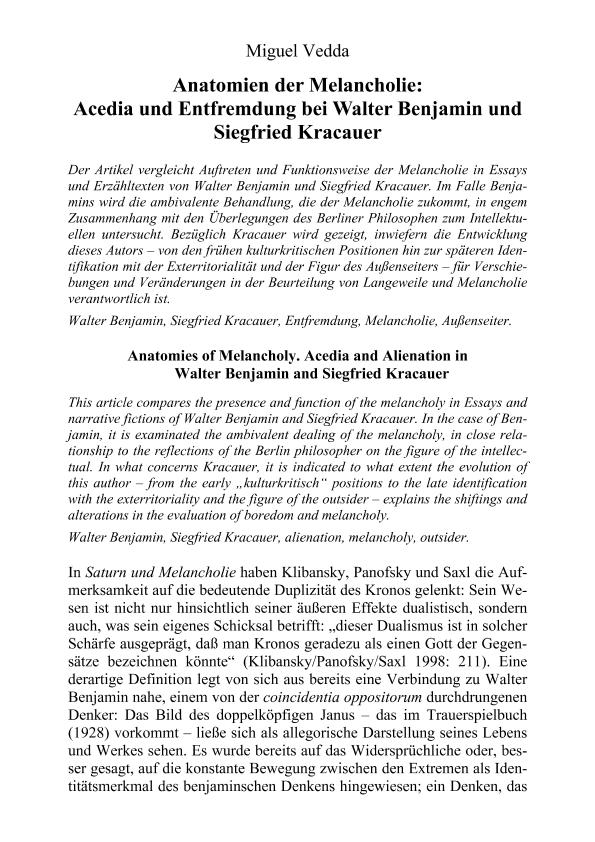Mostrar el registro sencillo del ítem
dc.contributor.author
Vedda, Miguel Angel

dc.date.available
2017-10-03T22:37:13Z
dc.date.issued
2013-03
dc.identifier.citation
Vedda, Miguel Angel; Anatomien der Melancholie: Acedia und Entfremdung bei Walter Benjamin und Siegfried Kracauer; Weidler; Ibero-amerikanisches Jahrbuch für Germanistik; 6; 3-2013; 101-118
dc.identifier.issn
1865-5319
dc.identifier.uri
http://hdl.handle.net/11336/25830
dc.description.abstract
La exposición se propone comparar el tratamiento de la melancolía en dos pensadores teórica, ideológica y biográficamente emparentados entre sí: Siegfried Kracauer y Walter Benjamin. En el caso de Kracauer, existe una elaboración de la melancolía en los ensayos tempranos (por ejemplo, en los “Cuadros de ciudades” reunidos en Calles en Berlín y en otros lugares, o en las reflexiones sociológicas sobre los efectos del proceso de secularización) y en las novelas Ginster y Georg. Estas consideraciones son retomadas bajo una nueva luz en las tardías Theory of Film y History. The Last Things before the Last. En Benjamin, la acedia recorre toda la obra temprana, y encuentra un punto de cristalización en el tratado sobre el Trauerspiel, pero posee también una presencia capital en Das Passagen-Werk. La propuesta es comparar las perspectivas de ambos autores, sugiriendo a la vez algunos paralelos con otros pensadores (A. Warburg, Panofsky, Lepenies).
dc.description.abstract
Der Artikel vergleicht Auftreten und Funktionsweise der Melancholie in Essays und Erzähltexten von Walter Benjamin und Siegfried Kracauer. Im Falle Benjamins wird die ambivalente Behandlung, die der Melancholie zukommt, in engem Zusammenhang mit den Überlegungen des Berliner Philosophen zum Intellektuellen untersucht. Bezüglich Kracauer wird gezeigt, inwiefern die Entwicklung dieses Autors – von den frühen kulturkritischen Positionen hin zur späteren Identifikation mit der Exterritorialität und der Figur des Außenseiters – für Verschiebungen und Veränderungen in der Beurteilung von Langeweile und Melancholie verantwortlich ist.
dc.description.abstract
This article compares the presence and function of the melancholy in Essays and narrative fictions of Walter Benjamin and Siegfried Kracauer. In the case of Benjamin, it is examinated the ambivalent dealing of the melancholy, in close relationship to the reflections of the Berlin philosopher on the figure of the intellectual. In what concerns Kracauer, it is indicated to what extent the evolution of this author – from the early „kulturkritisch“ positions to the late identification with the exterritoriality and the figure of the outsider – explains the shiftings and alterations in the evaluation of boredom and melancholy.
dc.format
application/pdf
dc.language.iso
deu
dc.publisher
Weidler
dc.rights
info:eu-repo/semantics/openAccess
dc.rights.uri
https://creativecommons.org/licenses/by-nc-sa/2.5/ar/
dc.subject
Melancolía
dc.subject
Literatura Alemana
dc.subject
Ensayo
dc.subject
Alienación
dc.subject
Walter Benjamin
dc.subject
Siegfried Kracauer
dc.subject.classification
Lingüística

dc.subject.classification
Lengua y Literatura

dc.subject.classification
HUMANIDADES

dc.title
Anatomien der Melancholie: Acedia und Entfremdung bei Walter Benjamin und Siegfried Kracauer
dc.title
Anatomies of Melancholy. Acedia and Alienation in Walter Benjamin and Siegfried Kracauer
dc.type
info:eu-repo/semantics/article
dc.type
info:ar-repo/semantics/artículo
dc.type
info:eu-repo/semantics/publishedVersion
dc.date.updated
2017-10-02T19:11:29Z
dc.journal.number
6
dc.journal.pagination
101-118
dc.journal.pais
Alemania

dc.journal.ciudad
Berlín
dc.description.fil
Fil: Vedda, Miguel Angel. Universidad de Buenos Aires; Argentina. Consejo Nacional de Investigaciones Científicas y Técnicas; Argentina
dc.journal.title
Ibero-amerikanisches Jahrbuch für Germanistik
dc.relation.alternativeid
info:eu-repo/semantics/altIdentifier/url/http://www.iajg.es/indice.htm
Archivos asociados
